Nakayama is in between Narita And Haneda International Airport
<クッキーについての同意並び欧州居住者向けプライバシーポリシー>
中山・下総・散歩道
Akibasan Shinseiji Temple in Gyotoku
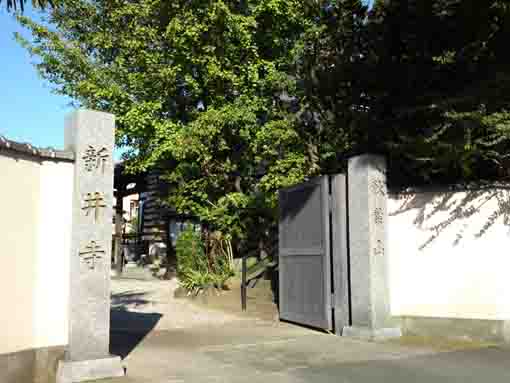
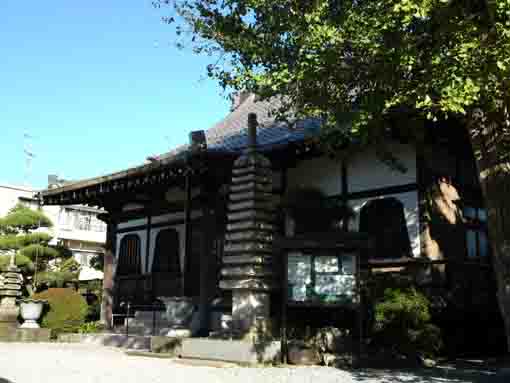
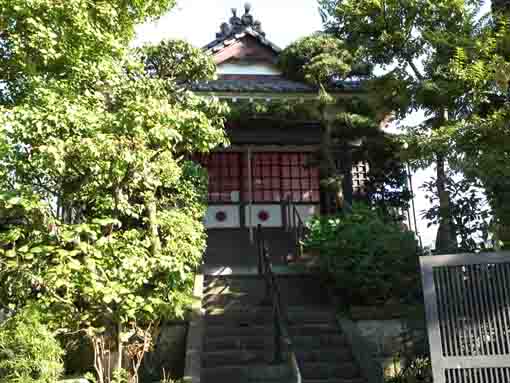
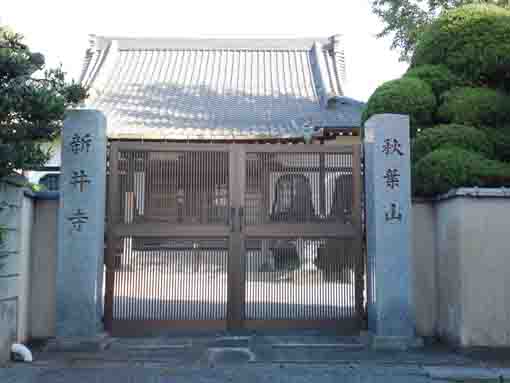
Akibasan Shinseiji Temple is the origin of the area name 'Arai' in Gyotoku. Arai means the new well, so Nozan Ogei, the founder of Shinseiji Temple dag a fine new well for people to live safe in Gyotoku. And Shakyozuka, a stone monument where written sutras ballied under stands in and Akiba Sanjakubo Daigongen, the god of prevening fires, is dedicated in Shinden Hall in Shinseiji Temple. The temple has many tall trees even in residential area in Gyotoku. Besides, it holds Shakyoe (meetings to copy sutras by hand), Zazene (Zen medication meetings) and tanka parties to study in it. Moreover, Akibasan Shinseiji Temple is the 27th temple of the 33 Pilgrimage in Gyotoku and Urayasu.
Why don't you visit Akibasan Shinseiji Temple?
Akibasan Shinseiji Temple
The History of Akibasan Shinseiji Temple belonging to Soto Shu
Akibasan Shinseiji Temple that is only a temple belonging to Soto Shu Sect in Buddhism in Gyotoku and Urayasu area was built in 1616. The head temple is of course Eiheiji Temple in Fukui Prefecture and Sojiji Temple in Kangawa prefecture, they are the Grand Head Temples of Sodo Shu. The main image is the statue of Shakamuni Butsu and they chant Shakamuni Butsu.Akibasan Shinseiji Temple is a branch temple of Hojoji Temple in Funabashi city and Nozan Ogei, the second chief priest of the temple, founded Shinseiji Temple.
In addition, there is Shinden Hall to dedicate Akiba Sanjakubo Daigongen, the god of preventing fires, in Akibasan Shinsaiji Temple so it is the head temple of Akibasan in Kanto region. Every November 18th, Akiba no Himaturi (the grand festival to pray for preventing fires) is traditionally held in it and supporters, believers and many people around visit and pray.
Moreover, Akibasan Shinseiji Temple has a stone monument of hand-copied sutras (Shakyozuka) that the 4th chief priest of it wrote them on clamshells and built the monument, then finally he gave him Kajo (cremated himself) to save people in Gytoku from disasters.
Now the 29th chief priest has kept tradition of Akibasan Shinseiji Temple since it founded and has held funeral and memorial services of supporters by the teachings of Buddha and the founders. And Shakyoe (meetings to copy sutras by hand), Zazene (Zen medication meetings) and tanka parties to study are held in Akibasan Shinseiji Temple to propagate adapted to the times and societies.
平成21(2009)年
秋葉山新井寺門前案内板より
抜粋・引用および参考
秋葉山新井寺門前案内板
秋葉山新井寺ホームページ
房総叢書 紀元二千六百年記念 第6卷葛飾誌略
改訂新版 市川のむかし話
市川市ホームページ
The Location and Access to Akibasan Shinseiji Temple
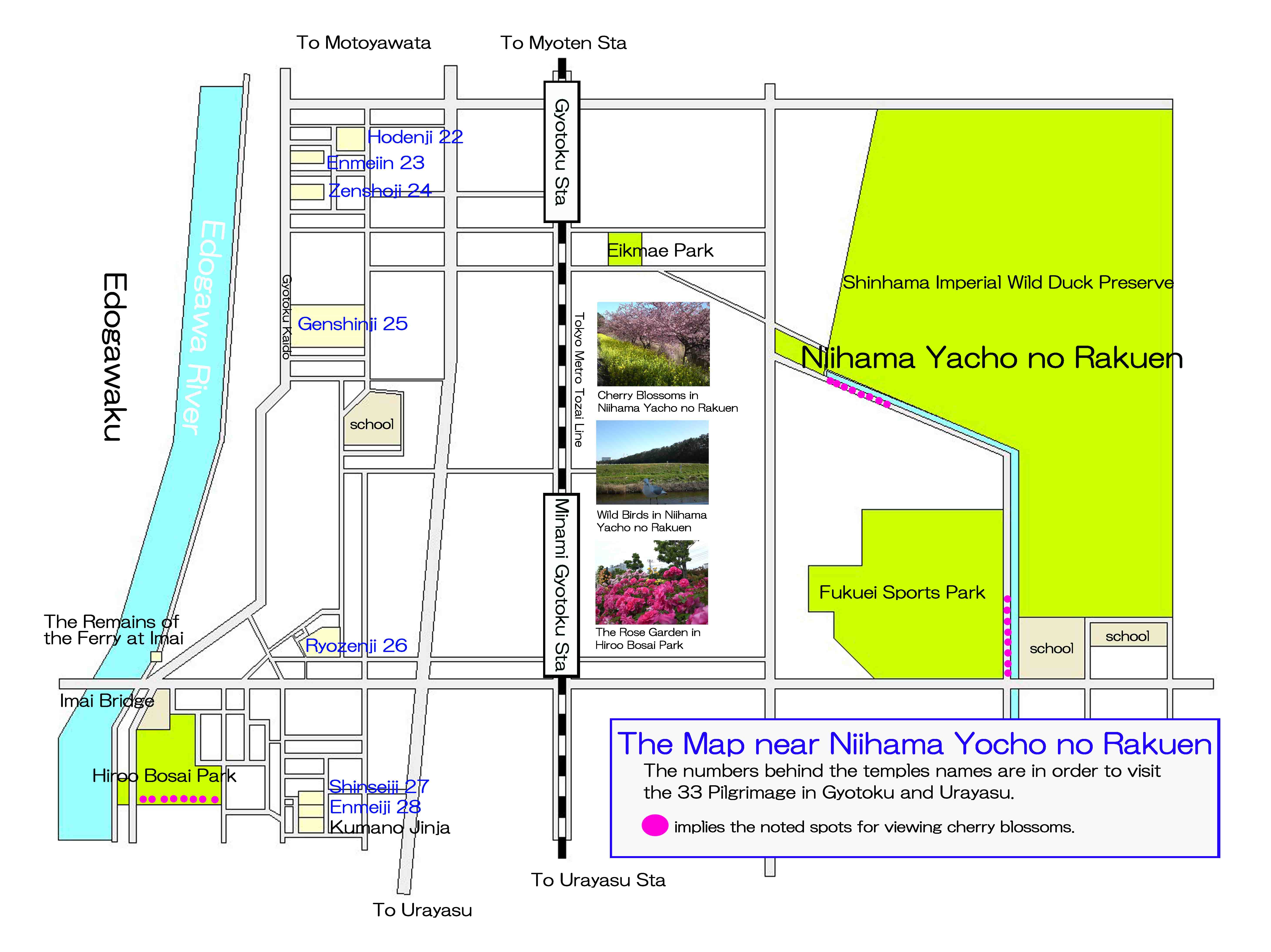
The map of the noted spots near Shinseiji Temple
PDF of the map of the landmarks near Niihama Yacho no RakuenAkibasan Shinseiji Temple
- Akibasan Shinseiji Temple has a great accessibility from both Narita and Haneda International Airport.
- From Narita International Airport, take JR Sobu-express line, transfer the line at Nishi-funabashi to Tozai line of Tokyo Metro bound to Nakano or Mitaka, get off Myoden Sta. And also take Keisei-line, transfer the line at Funabashi to Sobu-Local line, and transfer the line at Nishi-funabashi to Tozai line of Tokyo Metro bound to Nakano or Mitaka, get off Minami Gyotoku Sta and Urayasu Sta. It takes minimally 60 minutes from Narita Airport.
- From Haneda International Airport, take Keikyu-line bound to Narita, transfer the line at Nihonbashi to Tozai line of Tokyo Metro bound to Nishifunabashi, Tsudanuma or Katsutadai, get off Minami Gyotoku Sta and Urayasu Sta.
- From Tokyo (Otemachi) Sta, take Tozai line of Tokyo Metro bound to Nishi-funabashi, Tsudanuma or Katsutadai, get off Minami Gyotoku Sta and Urayasu Sta.
- From Akihabara Sta, take Sobu line bound to Chiba, Tsudanuma or Nishi Funabashi, transfer the line at Nishifunabashi to Tozai line of Tokyo Metro, get off Minami Gyotoku Sta and Urayasu Sta.
- 1-9-1 Arai, Ichikawa-shi, Chiba-ken
The Temples of the 33 Pilgrimage in Gyotoku & Urayasu
The list of the temples of the 33 Pilgrimages in Gyotoku and Urayasu
- 01 Tokuganji : 5-22 Hongyotoku Ichikawa-shi
- 02 Fukusenji :2-7 Futamata Ichikawa-shi
- 03 Choshoji : 8-5 Hongyotoku Ichikawa-shi
- 04 Jishoin : 1-10 Hongyotoku Ichikawa-shi
- 05 Daitokuji : 5-13 Shimonijuku Ichikawa-shi
- 06 Jorinji (abandoned) : around Kawara Ichikawa-shi
- 07 Shogenji : 3-6 Kawara Ichikawa-shi
- 08 Yofukuin : 5-16 Kawara Ichikawa-shi
- 09 Ryugonji (Sorinji) : 3-10-2 Tokagi Ichikawa-shi
- 10 Fukuoji (Sorinji) : 3-10-2 Tokagi Ichikawa-shi
- 11 Ryogokuji : 2-16-4 Koya Ichikawa-shi
- 12 Anyoji : 2-16-35 Koya Ichikawa-shi
- 13 Hosenji : 7-22 Hongyotoku Ichikawa-shi
- 14 Hozenji : 1-25 Honshio Ichikawa-shi
- 15 Jokanji : 23-24 Hongyotoku Ichikawa-shi
- 16 Shingyoji (Kyoshinji) : 38-18 Hongyotoku Ichikawa-shi
- 17 Kyozenji (Kyoshinji) : 38-18 Hongyotoku Ichikawa-shi
- 18 Hoshoji (abandoned) : now brought into 19 Tokuzoji
- 19 Tokuzoji : 8-10 Sekigashima Ichikawa-shi
- 20 Seiganji : 4-8 Oshikiri Ichikawa-shi
- 21 Korinji : 12-20 Oshikiri Ichikawa-shi
- 22 Hodenji : 7-1 Minato Ichikawa-shi
- 23 Enmyoin : 11-21 Minato Ichikawa-shi
- 24 Zenshoji : 18-20 Minato Ichikawa-shi
- 25 Genshinji : 1-16-26 Katori Ichikawa-shi
- 26 Ryozenji : 2-12-18 Ainokawa Ichikawa-shi
- 27 Shinseiji : 1-9-1 Arai Ichiakawa-shi
- 28 Enmeiji : 1-9-2 Arai Ichikawa-shi
- 29 Zenpukuji : 26-27 Todaijima Urayasu-shi
- 30 Kezoin : 3-10-3 Nekozane Urayasu-shi
- 31 Togakuji : 2-4-27 Horie Urayasu-shi
- 32 Hojoin : 4-14-1 Horie Urayasu-shi
- 33 Dairenji : 4-14-2 Horie Urayasu-shi
- extra Fujiwara Kannondo Hall 2-234 Fujiwara-cho Funabashi-shi
* Please ask some specific information in each temple.
Why don't you visit the 33 Temples on this movie?
This movie is a slideshow created by some pictures of the temples. Why don't you watch it?
- 広告 Advertisement -
